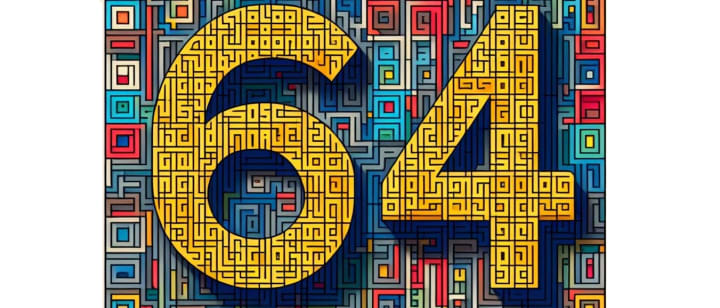When I'm sixty-four
Will you still need me?

When Paul McCartney wrote When I'm Sixty-Four he was just a boy, a youth. It is thought that he wrote the melody around the time when he was 14 years old, in 1956, adding the lyrics some 10 years later, with a little help from his friends. So he came up with the tune before Rock'n'Roll came on the scene. The whole world, for McCartney, was about to explode.
Now I am about to hit that benchmark age that McCartney was thinking about, 60-odd years ago. Now I am at the age that it seems young Paul was looking at with optimism. Or perhaps something of affection, given his father turned 64 in 1966, the year the Beatles were recording Sgt Pepper. Personally, I have always looked upon growing old with trepidation.
What does it mean to reach that age, to become (albeit gradually over some years) an old man? For reasons that might have something to do with my advancing years, I appear to be grappling for meaning from lots of different things. Whether the art that I look at, the poems and stories I read (and sometimes write), the changes the world is going through, or those that I am going through.
At 64 years of age, I am about to retire from my employment of nearly 17 years, having already reduced my working week to two days. While happy to have more me-time, I also have mixed feelings about crossing the threshold between being a useful worker and an old-aged pensioner (OAP), between having an order and structure to my daily life, and having to create one for my own purposes.
This grasp for meaning might stem from recent (completed 2018) postgrad studies in law. The first module I took when I began my studies with the Open University in 2013 was titled "Understanding legal meaning." This could be said to have been the emphasis of the entire master's degree, since my studies grappled with legal concepts and meaning throughout the course. What does 'law' mean? We take it for granted that the law is the law, whether we abide by it with meticulous attention, or pick and choose which aspects of law we want to observe. But I challenge anyone to explain the meaning of law in simple terms without giving themselves a headache. Sure, anyone can trot out a trite definition of "rules and regulations..." "code that society must abide by..." or however you want to frame it. But the first time you or anyone else questions whatever definition you come up with, you will start to understand why the meaning of law is so hard to grasp. As are so many other conceptual frameworks.

Likewise numbers. What do numbers mean? I have grappled with the concept of numbers for many years. Again, we know what it means to count, or place a numerical value on something. "Four apples, that's a pound weight, that'll be $1.90 please." This tells me the meaning of numerical values, quantities, price. It tells me what the names of the numbers are, but it does not tell me what the numbers mean.
Perhaps I am over-thinking it. Or am I? When I think of numbers and people, I wonder if a person can be compared to a number. The key anatomical signature that identifies the differences between every person who has ever lived is their genetic pattern, their DNA. When analysed down to its basic detail, this pattern could be considered analogous to a number. Perhaps it is a number but, then again, what is a number?
After all, what's in a number? Perhaps the most philosophical of mathematical and existential questions
I can describe a number's function and its numerical value but I cannot describe what in reality it is. I can see it, or rather see it represented. I can reduce my age to a number: 63 but nearly 64. I can think of various ways of describing what numbers do but I cannot say what they are. To me, it's a kind of existential conundrum and, to me, existentialism is the most pointless of philosophical approaches that I know of.

Going back to the question of my age, soon 64 years, this is something of an interesting number, a magic number, a square number. Multiply eight by eight and you get 64. Eight is the cube of two. If you multiply two by two five times, you get 64. 64 can be represented in binary as 1000000. This is just my point. The number we call 64 can be called 1000000 depending on whether you are representing the number in binary (base 2) or denary (base 10) form. If we can represent the number in binary, denary, hexadecimal (base 16) or any other way, what IS the number? What is its nature? What is its meaning?
What does it mean to be 64? Who cares? When my birthday arrives, I won't actually be 64 years old until some time in the afternoon using the Universal Time Coordinate datum (UTC), previously known as Greenwich Mean Time (GMT). I won't suddenly be any different for reaching a particular age designated by the name of a number that happens to be represented in denary convention by the square of another denary number, and that is also a 'round' number in binary. And yet the concept still intrigues me. Although of more concern to me is my gradual aging, my gradual loss of function, approach of ill health, decline and eventual death.
I recently posted a stumbling attempt at a poem contemplating the meaning of death and eternal rest: Beneath a tranquil sky
On the flip side, the positive, optimistic side, being 64-years old is also a time for living. Whatever the likely duration of my remaining time on Earth, something which I cannot begin to guess at, I will remain alive until the time of my death. If that's not an a priori truth, I don't know what is. What do I want to do with the rest of my life? Now that is a question that I have been pondering since Paul and his mates were singing When I'm Sixty-Four, as I imagine they were too.
This is a question for me to consider, but is also a question that I could equally pose to my loved ones and others around me. When I ponder the meaning of my own existence, I cannot but contemplate its place in relation to the people around me. My wife, children, wider family, friends, colleagues, associates, strangers on the train. In a few weeks I will leave my employer, and therefore work friends and colleagues, of nearly 17 years. They will no longer need me. What about my friends and family?
Will you still need me...
I hope that this rambling monologue has provoked some thought and perhaps reflection. If, at this point, you are still reading, I guess you must have gained something from the narrative and I am grateful to you for taking the time to read this piece. Please feel free to share your own thoughts on numbers, aging, laws, rock music, philosophy or anything else you care to put your mind to. Innit great to exercise the gray matter?
Best wishes to you for the year ahead. Peace, love and blessings.
As my Ghanaian friends might say: The year comes around...
Thanks for reading
Ray
About the Creator
Raymond G. Taylor
Author based in Kent, England. A writer of fictional short stories in a wide range of genres, he has been a non-fiction writer since the 1980s. Non-fiction subjects include art, history, technology, business, law, and the human condition.






Comments (6)
Yes 64 is time to leaving, a time when much of our "own" world ceases to need us. But let me quote Ian Gillan: "It's time for reflection. Time to think. Time to have another drink" :)
There are numerous words that we instinctively accept but find difficult to explain. In the realm of numbers, there exists an exceedingly complex science known as number theory, which led Georg Cantor to the brink of insanity. Kurt Gödel demonstrated that a sufficiently intricate logical system cannot be fully explained using concepts solely contained within the system itself. To comprehend it, we must incorporate concepts from outside that system. Therefore, the impossibility of strictly defining everything is fundamentally embedded in the foundation of logic. Exactly what drove Cantor into madness.
Age is just a number and you have made many connections in this piece of writing to think about.
From music, to law, to numbers. Lol, this made my head spin, especially when you brought in binary numbers 🤣🤣🤣
Life is always worth living. There is always someone you touched in some special way. Family members will always care. This is a story worth writing about. We all ponder on life.
I'm 54 and trying to think of something witty that rhymes. Been having a lot of the same thoughts.